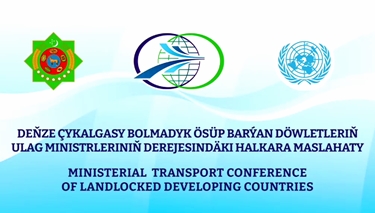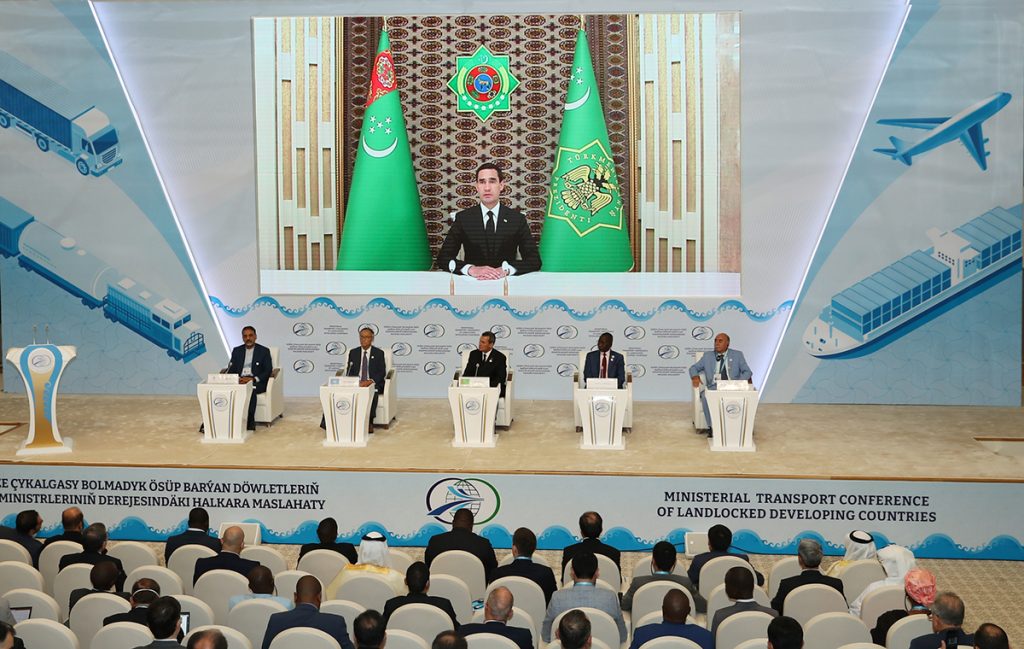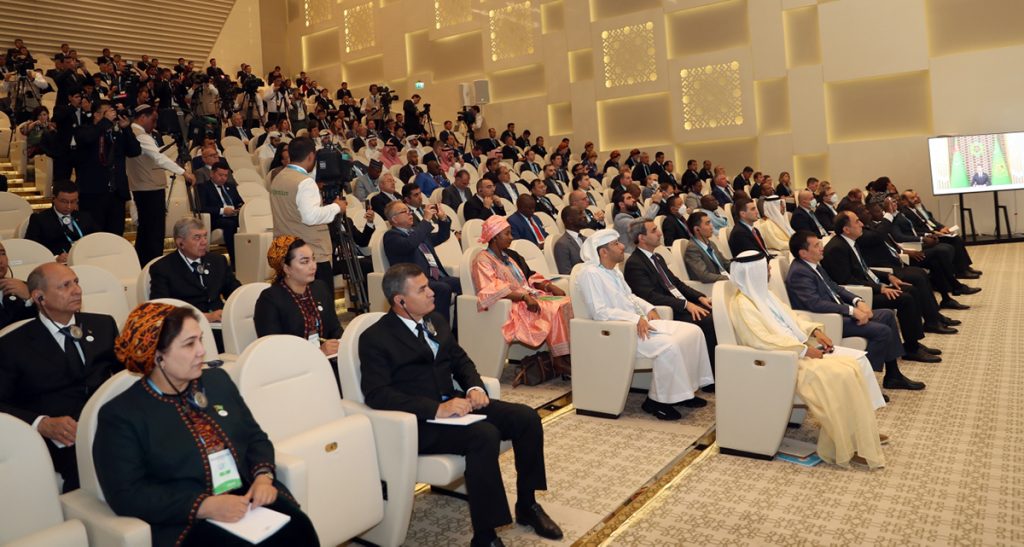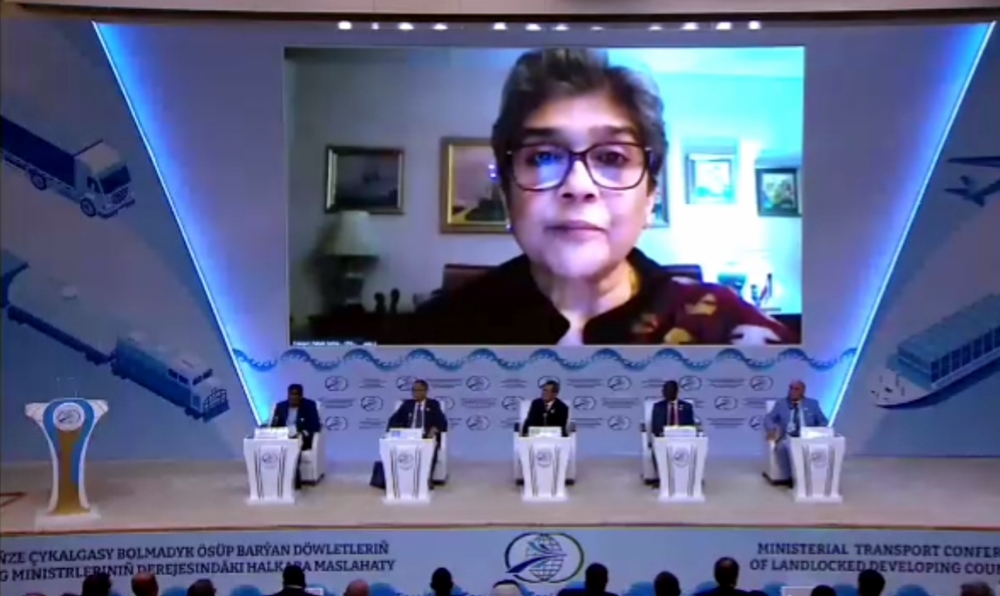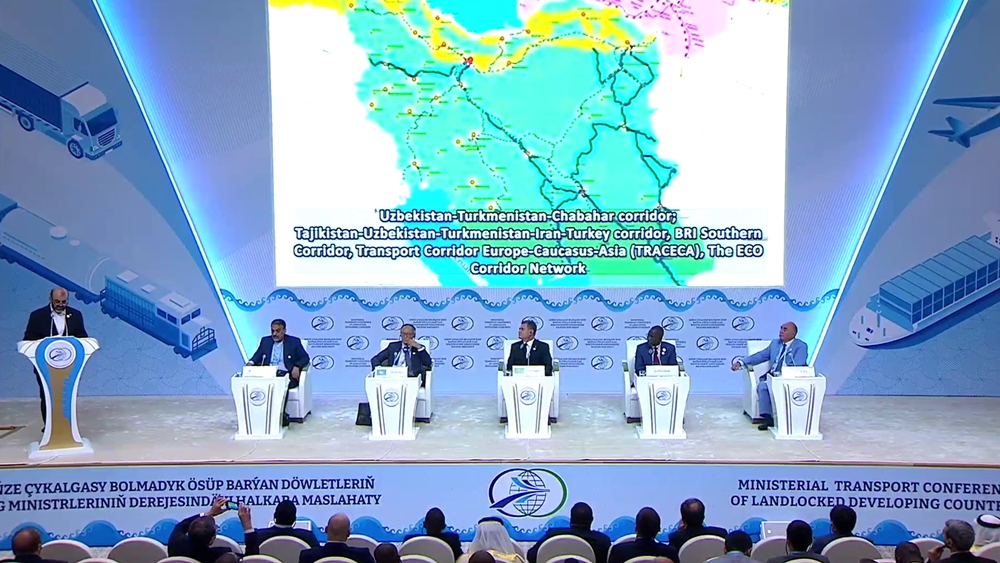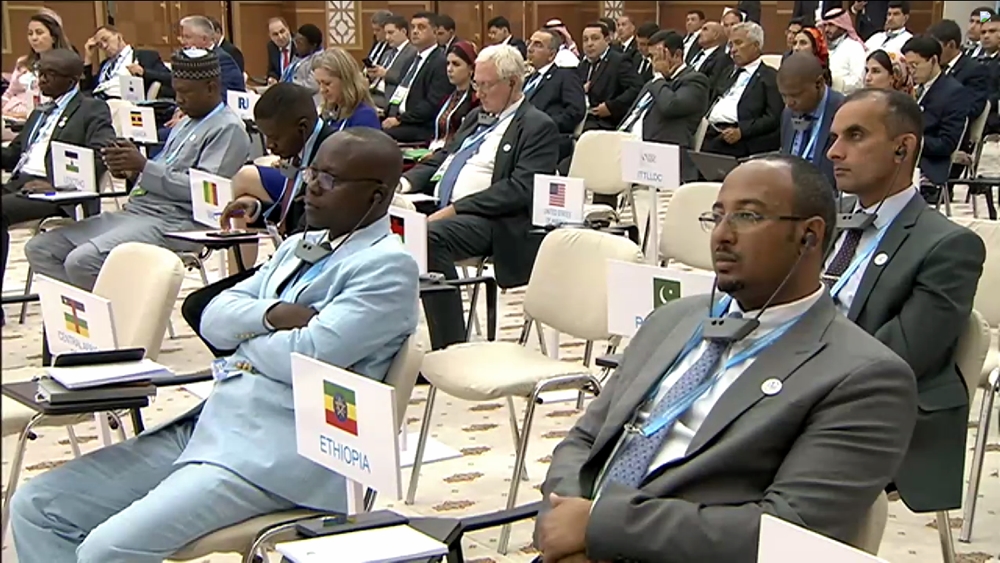32 landlocked developing countries are the home for over half a billion people. Their growth rates may vary, but the absence of direct access to the sea hinders them from keeping pace with global development agenda.
The ideas how to turn the landlocked countries into land-linked areas with wide connectivity opportunities will be generated during a two-day International Conference at the level of Ministers of Transport of Landlocked Developing Countries kicked off Monday (15 Aug) in the Avaza tourist zone, Turkmenistan.
The opening session of the conference under the theme “Ashgabat Process: Financing for Better Connectivity” started with a video message from President of Turkmenistan Serdar Berdimuhamedov.
The Turkmen leader stated that Turkmenistan intends to initiate the development of a resolution of the UN General Assembly on increasing the role of landlocked developing countries in the development and strengthening of global transport cooperation.
In his address, the President of Turkmenistan noted that “an analysis of modern processes, prevailing trends in the global economy convincingly shows that development of transport and communications is becoming increasing important and decisive.”
In this context, the potential of new transport and transit hubs is huge, vast spaces, human resources are involved in them, and serious investments are made.
UN Secretary-General Antonio Guterres sent the forum participants a statement, which underlined that transport and connectivity is critical to the future of all country, critical to reducing trade costs and improving access to the global markets, critical for achieving SDGs.
And yet landlocked countries face big obstacles in improving transport connectivity such as inadequate infrastructure that exacerbate inequality, multiple border crossings, complex administrative and border procedures. Covid-19 pandemic caused additional challenges such as delays, high transport costs, and supply chains disruptions.
The economic slowdown has cut the ability of governments to finance infrastructure projects.
UN General Secretary called for world community to work together to get transport back on track. He also emphasized the need to join efforts to close the financial and investment gap for communities of landlocked countries, being sure that they are not left behind.
2030 Agenda for Sustainable Development recognizes transport and connectivity as a key driver for achieving sustainable growth, stressed Ms. Rabab Fatima, Under-Secretary-General and High Representative for the Least Developed Countries, Landlocked Developing Countries and Small Island Developing States.
Transit transport is critically important for landlocked countries because of their geographical location and high dependance on external trade, which accounts for 45% of GDP compared of world average of 42%. However, infrastructure deficiencies, long distances to ports result in high transport and overall shipping costs. The LLDCs pay double transport costs than their coastal neighbors.
She reminded that the Vienna Program of Action for LLDCs does rightly stress the need to ensure LLDCs efficient access to and from the sea, reduction of high transport costs, better transit, transport infrastructure networks, transport exchange data – all to ensure increased participation of LLDCs global trade.
In spite of some progress, revealed by 2019 midterm review of implementation of Vienna program, connectivity remains the major obstacle to enhanced trade integration, said Ms. Rabab Fatima.
Moreover, Covid-19 pandemic further impacted negatively on LLDCs. Tourism dropped sharply, supply chains disrupted, including for supply of medicines.
High Representative for the Least Developed Countries, Landlocked Developing Countries and Small Island Developing States voiced five-point way out.
First, there is a need to close physical infrastructure gaps to enhance regional and international transport connectivity and expand all modes of transport infrastructure.
Secondly, there is a need must promote soft infrastructure, that means improving regulatory frameworks and institutional arrangements for LLDCs.
Thirdly, more should be done to promote digitalization. Smart transport can promote deep integration of new technologies in the transport sector, ensuring steadfast, easier and more affordable movement of goods.
Forth, promoting clean and efficient transportations with the development of policies to support a transition. The resilience needs collaboration of LLDCs with development partners for technology transfer.
Finally, attracting finance from all possible source is fundamental for achieving these aims, including official development assistance, public-private partnerships, funding from private sector, multilateral regional development banks.
***
Then, an exchange of views and experience took place at the level of ministers and deputy ministers of transport of the UAE, China, Pakistan, Uzbekistan, Tajikistan, Zambia, Malawi, Burkina Faso, Iran, Azerbaijan, Kazakhstan, Armenia, Saudi Arabia, Russia and Georgia.
As seen the discussion also attracted the countries with access to the open ocean. The main reason behind their involvement in the Ashgabat Process is the active support for the agenda in the field of unlocking the economic potential of the LLDCs.
***
In afternoon, two panel sessions of the conference took place.
The first session was devoted to the progress and challenges in achieving the transport connectivity specific objectives of the Vienna Programme of Action, the transport related SDGs, and impact of the COVID-19 pandemic.
The session highlighted major achievements, key challenges, lessons learnt and best practices and opportunities and priority areas for action.
The second session explored solutions in all the possible sources of financing to support improved transport connectivity for LLDCs including public, private, public-private partnerships, official development assistance, and other financing mechanisms.
***
Ashgabat Process Conference attracted delegates from 39 countries and over 30 international organizations and multilateral financial institutions, including UN entities, World Customs Organization, ECO, TRACECA, Intergovernmental Council of Road Administrations, Asian Infrastructure Investment Bank, Asian Development Bank, Islamic Development Bank, IRU, ITF, ICTD.
The first Global Sustainable Transport Conference took place in November 2016 in Ashgabat, Turkmenistan. Its outcome – the Ashgabat Statement on Commitments and Policy Recommendations – notes the importance of addressing the special needs of LLDCs.
The Second United Nations Global Sustainable Transport Conference was held in Beijing, China in hybrid format in October 2021.
The conference in Turkmenistan is a part of the preparatory process of the Third UN Conference on the Landlocked Developing Countries, to be held in 2024
Address by President of Turkmenistan Serdar Berdimuhamedov
Dear Heads of delegations,
Ladies and Gentleman!
I want to welcome you and express my gratitude for accepted invitation to participate ministerial transport conference for landlocked developing countries convened on the initiative of Turkmenistan under auspices of the UN.
Today the heads of transport agencies from more than 30 states represented at this forum, delegations of international organizations, financial institutions, expert communities are participating in the work of this conference, which speaks of the importance of session, relevance and timeliness of its convening. And surely such a representative composition of participants is evidence of respect for Turkmenistan recognition its contribution to the process of global cooperation in the transport sector.
An analysis of modern processes, prevailing trends in the global economy convincingly shows that development of transport and communications is becoming increasing important and decisive. The optimization of transport and transit routes, construction of modern infrastructure for the delivery of raw materials and finished goods is becoming a key integration factor especially for states that do not have direct access for sea terminals.
Today against a backdrop of difficult situation in worldwide production, it is the transport and communication component that can give a necessary impetus to the economic relations, stimulate economic activity and to some extent, give new meaning to the entire system of global geoeconomics.
In this context the potential of new transport and transit hubs is enormous. They involve vast human resources and significant investments are made. All this creates opportunities for the transformation of transport segment into one of the drivers of development of global economy, protecting it from distortion, recession and gaps in the development pace between the countries and regions.
Future belongs to the combined transport communication system with access to the largest international and regional sea, river, road, railroad and air hubs, their best combination and use advantage of each of them.
Dear participants,
Coronavirus pandemic has affected almost all states and the negative impact on the development of the world economic relations. The landlocked developing countries is arguably turned out to be the most vulnerable from the point of view of transport component.
And under these circumstances there is an urgent need to consolidate our efforts to concentrate them on achieving prompt and obvious results.
One of the most important directions in this respect is the formulation of common principles of work within the frames of the United Nations. In our opinion transport issues should take their prominent and firm place in the UN agenda as a separate line of activity of the world organization. The active policy of Turkmenistan is particularly aimed at giving the dialogue on transport issues a systematic consistent character.
As it is known our country initiated the first global conference on sustainable transport held in Ashgabat in November 2016. Turkmenistan has also initiated key resolutions of United Nations General Assembly on sustainable transport and development of international cooperation in transport sphere adopted in 2014, 2015, 2017, 2021.
Today it can be confidently stated that the dialogue on the development of the global transport particularly at the highest level has begun and assumes furthermore ever-increasing mindful and integral form, which is participated by the states, companies, international institutions and organizations.
Being rightly proud of this successes Turkmenistan does not intend to slow down the pace of its proactive participation in the global transport dialogue. Moreover, our country is ready for the intensification and expansion, saturation with new certain projects and plans.
In this context, I propose to consider the establishment of special working group at the UN, which will defend the interests of landlocked development countries in the transport sector and conduct a systematic work with the relevant UN agencies for this purpose.
We also consider it to be in due to time to start drafting a General Assembly resolution On enhancing the role of landlocked developing countries in the development and strengthening of global transport cooperation. It seems that such a document could give impetus to the promotion of interests of our states, to show the significance and understanding appropriate issues and commitment of the world community to their solution. Turkmenistan stands ready to proceed with the preparations of this document and open for all kinds of constructive proposals and recommendations.
We do hope for the support of given initiatives.
Dear participants,
The Ashgabat process is an essential and integral part of global transport agenda. It is designed to ensure the logic and sequence of further cooperation in the field of global transport, to affirm the legitimate interests of the landlocked developing countries and to specify the goals and objectives of our collaboration.
During this conference you need to determine the strategic guidelines and integration priorities in the global transport flows on a mutually beneficial partnership basis.
I have no doubt that decisions and proposals, adopted by the current forum will lay down a basis for the preparation of third UN Conference of Landlocked Developing Countries, scheduled for 2024.
Turkmenistan will strongly strive for achieving the set goals together with the partners and supporters. I sincerely wish all the participants of the conference successful and fruitful work.
Thanks for your attention.
///nCa, 16 August 2022 (photo source – TDH, live broadcast screenshots)
